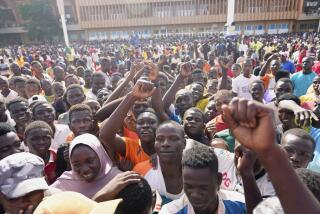Nigeria’s Opposition Insists Struggle Goes On
- Share via
LAGOS, Nigeria — As Nigerians continued waiting for their new military government to announce its plans for a transition to civilian rule, members of the country’s political opposition insisted Sunday that the fervor of their struggle for democracy has not been stifled after the death of popular politician Moshood Abiola.
Abiola, who died of an apparent heart attack last week after four years in jail, was buried Saturday after a team of international pathologists released preliminary findings indicating that his demise was not the result of foul play, as many of his supporters suspected.
The business mogul turned politician--who was imprisoned for claiming the presidency on the basis of an annulled election in 1993 that he was poised to win--had unified Nigeria’s opposition movement around a common cause: respect for democracy, civil liberties and human rights. Without Abiola, who had strong appeal primarily among the country’s southern masses, many average Nigerians said they felt the glue that held the pro-democracy movement together had evaporated.
However, human rights leaders and civic activists, who make up the core of Nigeria’s political opposition, stress that the message and purpose of their movement transcend any single individual.
“The personalities like Abiola may have gone, but the issues remain the same,” said Olawale Fapohunda, a representative of the Lagos-based Civil Liberties Organization. “Abiola was simply the symbol of what was justice. The whole movement was not personalized. The death of Abiola is seen as a setback, but it has little consequences as far as the opposition is concerned.”
Many of the dozens of groups that constitute Nigeria’s pro-democracy movement are advocating that the military regime hand over power Oct. 1 to a civilian government of national unity and reconciliation, one that would reflect all segments of this West African country of more than 100 million people.
As envisioned by Abraham Adesanya, chairman of the National Democratic Coalition--the main force behind Abiola--such a transitional government would remain in place for four or five years. It would allow new parties to emerge, create an independent electoral commission and consist of 24 members--four each from the country’s six geopolitical zones.
*
Of critical concern now are the age-old rifts that exist between Nigeria’s various ethnic groups, particularly the Yorubas from the south, who dominate the movement for democracy, and the northern Hausas and Fulanis, who have traditionally formed the ruling class.
Much of the south has remained poor despite the region’s abundance of crude oil--source of Nigeria’s sole export industry--while a core of the northern military elite has reaped huge benefits.
Tensions have already intensified with the death of Abiola. Yorubas and Hausas in Lagos and elsewhere in Abiola’s southwestern stronghold fought one another when the news was announced.
The government of Gen. Abdulsalam Abubakar, successor to Gen. Sani Abacha, who died last month also of an apparent heart attack, is expected this week to announce his program for a transition to democracy.
Abubakar has already won worldwide praise for his initial goodwill gestures, such as releasing dozens of political detainees and commuting the death sentences of six people, including a former military leader, who were accused of plotting a coup against Abacha. Still, such acts have done little to convince many average citizens that the military, which has ruled Nigeria for all but 10 years since the country’s independence from Britain in 1960, has changed its spots.
“While people are appreciative, they are still looking at [the Abubakar regime] with a lot of skepticism,” said Fapohunda of the Civil Liberties Organization. “People wouldn’t be surprised if tomorrow he says they are going to stay for another five years. That is where problems will start.”
More to Read
Sign up for Essential California
The most important California stories and recommendations in your inbox every morning.
You may occasionally receive promotional content from the Los Angeles Times.














